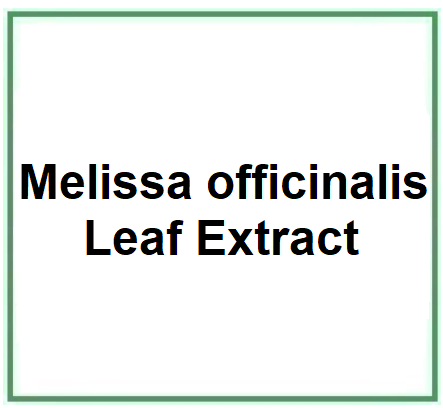Melissa officinalis Leaf Extract comes from the leaves of Melissa officinalis, commonly known as lemon balm. Lemon balm is valued for its calming and anti-inflammatory properties and is frequently used in skincare products, cosmetics, and herbal preparations.
The name describes the sructure of the molecule
- "Melissa officinalis" is the botanical name of the plant from which the extract is derived.
- "Leaf Extract" indicates that the extract comes from the plant's leaves.
Description of raw materials used in production
The leaves of Melissa officinalis are the main raw material. These leaves are harvested from the plant and then processed to produce the extract.
Synthesis process
- Leaf collection - Leaves of Melissa officinalis are harvested when the plant is in full bloom.
- Extraction - The leaves are then immersed in a suitable solvent (e.g., water, alcohol, or a combination of both) to extract beneficial compounds.
- Filtration - After a set period, the mixture is filtered to remove any solid residues.
- Concentration - The extracted liquid might then be concentrated to boost the potency of the extract.
- Packaging - Once the desired extract is achieved, it's packaged for sale or used as an ingredient in cosmetic and skincare products.
What it is for and where
Cosmetics
Skin conditioning agent. It is the mainstay of topical skin treatment as it has the function of restoring, increasing or improving skin tolerance to external factors, including melanocyte tolerance. The most important function of the conditioning agent is to prevent skin dehydration, but the subject is rather complex and involves emollients and humectants that can be added in the formulation.
Applications
Cosmetic and Skin Care
- Soothing: The extract is known for its anti-inflammatory properties, which makes it effective in calming irritated or sensitive skin.
- Antioxidant: Rich in flavonoids and other compounds, it helps protect the skin from oxidative stress and free radical damage.
- Antiviral: It has demonstrated effectiveness against the herpes simplex virus, making it an ingredient in some lip balms aimed at treating cold sores.
- Astringent: Can help tighten the skin and reduce the appearance of pores.
Traditional Medicine
- Relaxation and Sleep: Lemon balm is often used to reduce anxiety, improve mood, and promote sleep.
- Digestive Aid: The herb is consumed as a tea to alleviate various digestive discomforts.
- Antiviral and Antibacterial: It's recognized for its broad-spectrum antimicrobial activity.
Perfumery and Aromatherapy
- Fragrance: Provides a fresh, lemony scent to products.
- Relaxing Properties: The pleasant aroma is used in aromatherapy for relaxation and stress relief.
![]() Melissa officinalis (Lemon Balm) Leaf Extract
Melissa officinalis (Lemon Balm) Leaf Extract 
